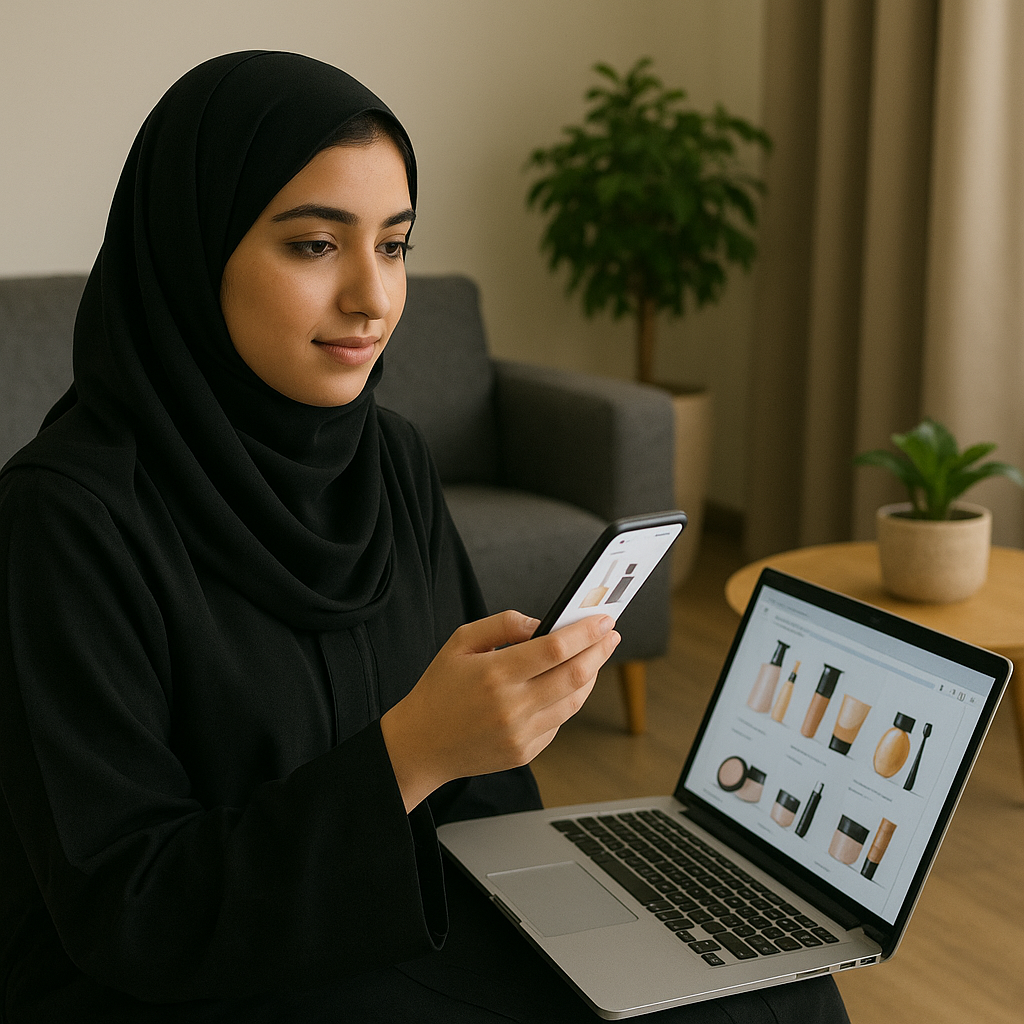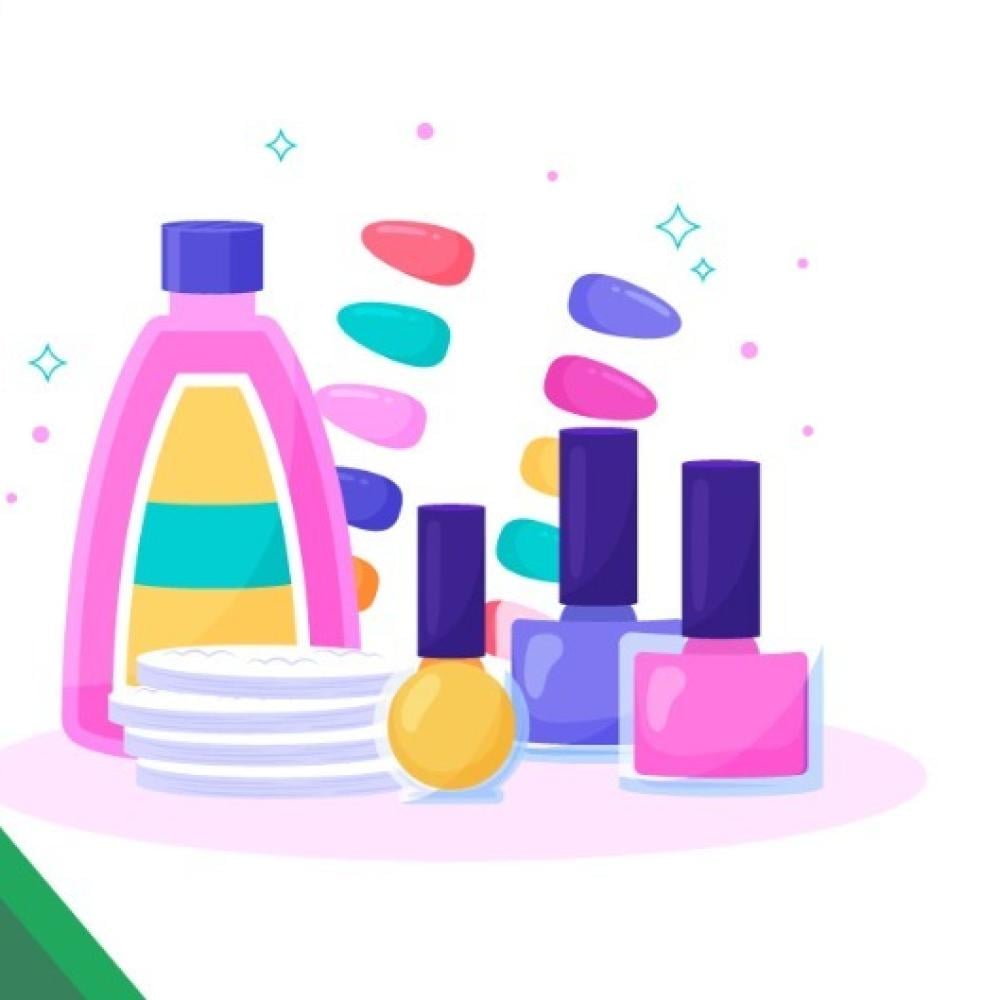مرحبًا بكم في موقع مستحضرات تجميل حيث نقدم لكم أفضل المنصات لبيع منتجات التجميل عبر الإنترنت. إذا كنت تبحث عن طريقة فعالة للوصول إلى جمهور واسع وزيادة مبيعاتك، فقد وصلت إلى المكان الصحيح. نحن نقدم دليلًا شاملًا لأفضل المنصات التي تساعدك على بيع منتجات التجميل الخاصة بك بكل سهولة.
هل تعلم أن اختيار المنصة المناسبة يمكن أن يؤثر بنسبة كبيرة على نجاحك في عالم بيع منتجات التجميل على الإنترنت؟ هنا، ستجد مجموعة من الخيارات التي تناسب احتياجاتك، سواء كنت مبتدئًا أو محترفًا في هذا المجال. من الأسواق الإلكترونية الشهيرة مثل أمازون وإيباي إلى المنصات المتخصصة في منتجات التجميل، نحن هنا لمساعدتك في اتخاذ القرار الصحيح.
تصفح مجموعتنا من النصائح والتوجيهات حول كيفية استخدام هذه المنصات بشكل فعال. سنستعرض لك كيفية تحسين قوائمك، كيفية جذب العملاء، وكيفية تقديم منتجاتك بطريقة مميزة. مع معلوماتنا، ستكون جاهزًا لزيادة ظهورك على الإنترنت وتحقيق أهدافك في بيع منتجات التجميل.

✿ أفضل متاجر لمنتجات التجميل عبر الإنترنت في السعودية ✿
في عصر التسوق الرقمي، أصبحت متاجر التجميل الإلكترونية في السعودية وجهة رئيسية لعشاق الجمال، خصوصًا أولئك الذين يبحثون عن الراحة، التنوع، والعروض الحصرية. في هذا المقال، سنأخذك في جولة فريدة بين أفضل المواقع والمتاجر التي توفر منتجات تجميل أصلية وعالية الجودة.
✨ اكتشفي أحدث صيحات مستحضرات التجميل من خلال المتاجر الإلكترونية
إذا كنتِ ممن يعشقن مواكبة الموضة، فالمتاجر الإلكترونية تمنحك فرصة مثالية لاكتشاف أحدث الصيحات، سواء في المكياج أو العناية بالبشرة والشعر. العديد من المواقع تقدم أقسامًا مخصصة لأحدث الإصدارات والعلامات الجديدة.
🛍️ تسوقي بأمان: أفضل منصات لشراء منتجات التجميل في السعودية
من أشهر المتاجر التي أثبتت موثوقيتها:
- سوق دوت كوم
- نون للتجميل
- متجر سيفورا الإلكتروني
- ثلاجة دبي: رغم أنه متخصص في المواد الغذائية، إلا أن قسم الجمال والعناية فيه يشهد نموًا لافتًا وموثوقًا.
كل هذه المنصات توفر خيارات دفع آمنة، وخدمة توصيل سريعة، وتقييمات حقيقية من العملاء.
📦 دليل تسوق منتجات التجميل أونلاًين: نصائح للتسوق الذكي
✔️ قارني الأسعار قبل الشراء
✔️ تأكدي من تقييم المنتج
✔️ تابعي العروض الأسبوعية
✔️ اختاري متاجر تضمن سياسة إرجاع واضحة
💄 أجمل منتجات التجميل المتاحة في المتاجر الإلكترونية السعودية
من كريمات الأساس إلى العطور الأصلية، تقدم المتاجر الإلكترونية خيارات لا حصر لها من منتجات مثل:
- MAC
- Huda Beauty
- The Ordinary
- NARS
⭐ أهمية التقييمات في اختيار منتجات التجميل عبر الإنترنت
قبل الشراء، احرصي على قراءة تجارب المشترين السابقين. هذه التقييمات تعطيك فكرة عن فعالية المنتج، مدى أصالته، وتجربة الشحن.
🏠 مميزات التسوق لمنتجات التجميل من الراحة في منزلك
لا حاجة للوقوف في طوابير طويلة أو تحمل زحام المجمعات التجارية. بضغطة زر، يمكنك تصفح آلاف المنتجات، والطلب خلال دقائق.
📊 مقارنة بين أبرز مواقع بيع مستحضرات التجميل في السعودية
المتجر التنوع سرعة التوصيل تقييم العملاء نون ممتاز سريع 4.5/5 سيفورا مميز جدًا متوسط 4.7/5 ثلاجة دبي جيد جدًا سريع 4.6/5 💅 كيف تختار أفضل منتجات التجميل من المتاجر الإلكترونية؟
ابدئي باختيار المنتجات التي تناسب نوع بشرتك. ثم اختاري من العلامات المعروفة، وتأكدي من وجود ضمان جودة.
🎁 أحدث العروض والتخفيضات على منتجات التجميل في السعودية
تقدّم المتاجر مثل ثلاجة دبي عروضًا شهرية رائعة على منتجات العناية بالبشرة والشعر. تابعي صفحاتهم على وسائل التواصل للحصول على التنبيهات أولاً بأول.
🏆 أفضل 10 متاجر لبيع منتجات التجميل عبر الإنترنت في السعودية
- سيفورا
- نون
- نمشي
- قولدن سنت
- جوميا
- iHerb
- أمازون السعودية
- بيوتي باي
- ثلاجة دبي
- Faces
🧠 تسوق بذكاء: دليل اختيار متجر منتجات التجميل المثالي في السعودية
- ابحثي عن التوصيل المجاني
- تأكدي من وجود سياسة إرجاع
- احصلي على كاش باك أو نقاط ولاء
🛒 اكتشف أفضل منصات التسوق لمنتجات التجميل في السعودية
أهمها: ثلاجة دبي التي توسعت مؤخرًا في قسم الجمال، وأصبحت خيارًا رائعًا للتسوق الاقتصادي والآمن.
🌸 منتجات التجميل السعودية: أين تجد الأفضل عبر الإنترنت؟
العلامات السعودية المحلية بدأت بالتميز في هذا المجال مثل لوزولا وهيا، ويمكنك إيجادها بسهولة على المتاجر المحلية.
🔐 كيف تختار متجر موثوق لمنتجات التجميل في السعودية؟
ابحث عن:
- التقييمات الجيدة
- شهادة الثقة الإلكترونية
- تعدد خيارات الدفع
🔥 أبرز العروض والخصومات على مواقع بيع منتجات التجميل في السعودية
تشمل عروضًا مثل:
- خصومات تصل إلى 70%
- كوبونات فورية عند التسجيل
- توصيل مجاني فوق مبلغ معين
📝 تقييمات لأشهر متاجر منتجات التجميل الإلكترونية في السعودية
أجمع العملاء على أن ثلاجة دبي تقدم خدمة عملاء ممتازة وتوصيل سريع، إضافة إلى منتجات ذات جودة عالية وبأسعار مناسبة.
💻 التسوق عبر الإنترنت لمنتجات التجميل: فوائد وتحديات في السعودية
الفوائد:
- توفير الوقت
- عروض مستمرة
- تنوع مذهل
التحديات:
- تأخر التوصيل أحيانًا
- صعوبة التأكد من اللون أو القوام
🌿 مستحضرات التجميل الطبيعية عبر الإنترنت: جمالكِ يبدأ من الطبيعة 🛍️💄
في عصر يتّجه فيه العالم نحو الاستدامة والوعي الصحي، تبرز مستحضرات التجميل الطبيعية كخيار مفضل لدى الكثير من النساء في السعودية والدول العربية 🌍. لم يعد الجمال يعني فقط مظهرًا خارجيًا، بل أصبح مرآة لصحة البشرة والاهتمام بالمكونات. وفي ظل تزايد الإقبال على التسوق الإلكتروني، باتت المتاجر الرقمية تعرض تشكيلات واسعة من منتجات التجميل الطبيعية عبر الإنترنت ✨.
1. لماذا تختارين مستحضرات التجميل الطبيعية؟ 🌸
مستحضرات التجميل الطبيعية هي منتجات تعتمد على مكونات نباتية وخالية من المواد الكيميائية القاسية مثل البارابين والسيليكون والكحول الصناعي. ومن أهم أسباب التوجه نحو هذا النوع من المنتجات:
- حماية البشرة من التهيج والحساسية ❌🚫.
- تعزيز صحة الجلد على المدى الطويل 🌿.
- احترام البيئة ومصادر الطبيعة ♻️.
- دعم علامات تجارية مسؤولة ومهتمة بجودة المكونات 💚.
2. مستحضرات التجميل الطبيعية عبر الإنترنت في السعودية 📦
انتشرت المتاجر الإلكترونية التي تعرض مستحضرات تجميل طبيعية في المملكة، وأصبح بإمكانكِ طلب المنتجات المفضلة بسهولة من المنزل، مع خيارات توصيل سريعة داخل المدن الكبرى مثل الرياض، جدة، والدمام 🚚.
من أبرز هذه المتاجر:
- متجر ثلاجة دبي الذي أصبح لا يقتصر على الأغذية فقط، بل يقدم أقسامًا متكاملة لمستحضرات التجميل الطبيعية من علامات موثوقة 🌟.
- متاجر متخصصة في العناية بالبشرة مثل "نون" و"آي هيرب" التي تقدم عروضًا يومية على منتجات التجميل العضوية 🍯.
3. ما هي المنتجات التي يجب أن تبحثي عنها؟ 🔍
عند تسوق مستحضرات التجميل الطبيعية عبر الإنترنت، ابحثي عن:
- كريمات ترطيب بخلاصة الألوفيرا أو زيت الجوجوبا 🌼.
- أحمر شفاه نباتي غني بزبدة الشيا 🍫.
- شامبو عضوي خالٍ من السلفات 🧴.
- ماسكات طبيعية للبشرة تحتوي على طين البحر الميت أو الفحم النشط 🖤.
4. نصائح لشراء مستحضرات التجميل الطبيعية أونلاين 🧠
🔸 اقرئي المكونات: لا تثقي بأي منتج يُطلق عليه "طبيعي" ما لم تتأكدي من قائمة المكونات.
🔸 راجعي تقييمات العملاء: تجربة الآخرين هي بوصلتك لاختيار الأفضل.
🔸 تابعي العروض: الكثير من المتاجر الإلكترونية تقدم خصومات حصرية عبر التطبيقات 📱.
🔸 تحققي من سياسة الاسترجاع: بعض المنتجات قد لا تناسب بشرتكِ رغم طبيعتها، فاحرصي على سهولة الإرجاع 🔁.
5. فوائد التسوق من متجر متخصص مثل ثلاجة دبي 🌐
متجر ثلاجة دبي أثبت جدارته كأحد أبرز المتاجر الإلكترونية التي تواكب الاتجاهات الحديثة في مجال التجميل الطبيعي. من مميزات التسوق من هذا المتجر:
- منتجات مختبرة ومعتمدة ✅.
- دعم مباشر وخدمة عملاء متوفرة على مدار الساعة 📞.
- توصيل سريع وآمن لجميع المناطق السعودية 🇸🇦.
- تشكيلة واسعة من المنتجات الطبيعية بأسعار منافسة 💸.
6. كيف يؤثر المنتج الطبيعي على صحة بشرتك؟ 🧖♀️
البشرة مثل أي عضو في الجسم، تتأثر بما يُوضع عليها. فالمكونات الطبيعية تغذي الجلد وتمنحه:
- إشراقة طبيعية ✨.
- توحيد لون البشرة 🍑.
- تقليل ظهور التجاعيد 👵.
- ترطيب عميق دون انسداد المسام 💧.
7. الاتجاهات القادمة في عالم التجميل الطبيعي 🧪
- منتجات بدون ماء (Waterless Beauty): تركيبات مركّزة أكثر فعالية 🌿.
- التركيز على التغليف المستدام: عبوات قابلة لإعادة التدوير ♻️.
- دمج مستحضرات التجميل والعناية بالبشرة في منتج واحد لتقليل الاستخدام اليومي.
8. هل المنتجات الطبيعية أغلى؟ وهل تستحق السعر؟ 💰
رغم أن بعض المنتجات الطبيعية قد تكون أعلى سعرًا من التجارية، إلا أن الفارق يعود إلى جودة المكونات وخلوها من الإضافات الضارة. هذا يعني:
- تقليل زيارات العيادات الجلدية 🔬.
- توفير على المدى الطويل من خلال تقليل المشاكل الجلدية 🎯.
9. تجارب حقيقية من المستخدمين في السعودية 🗣️
"من يوم استخدمت ماسك الطين من متجر ثلاجة دبي وبشرتي ما شاء الله صارت صافية وناعمة!" – سارة من الرياض 🌟.
"أفضل روج نباتي شريته كان من عروض نون، ما يجفف الشفاه أبداً." – ريم من جدة 💄.
أفضل 5 منصات جمالية عبر الإنترنت

من المنصات العديدة المتاحة عبر الإنترنت، هناك خمسة منصات تبرز كوجهات رئيسية لعشاق الجمال. فبينما تتعدد الخيارات، يجب اختيار المنصة التي تلبي احتياجاتك التجميلية بشكل كامل. لنستعرض معًا هذه المنصات وأهمية كل واحدة منها.
نبذة عن كل منصة
- موقع سماعة: يعد من أكبر المواقع المتخصصة في بيع مستحضرات التجميل، حيث يقدم مجموعة واسعة من العلامات التجارية المحلية والعالمية.
- أهلا يا حبيبي: منصة فريدة تضم مجموعة مختارة من منتجات الجمال المصنعة بأيدي محلية، دعما للصناعات التقليدية.
- شعاع: تقدم المنتجات بأسعار تعتبر من الأفضل في السوق مع شحن مجاني للطلبات التي تتجاوز حد معين.
- فاست بيوتي: تناسب هذه المنصة الهواة والمحترفين على حد سواء، حيث توفر مجموعة متنوعة من الأدوات التجميلية.
- أونلاين بيوتي: معروف بالتخفيضات الدورية التي تجعل التسوق تجربة ممتعة واقتصادية.
مميزات كل منصة
لكل منصة ميزاتها الخاصة، مما يجعل من الضروري للمستخدمين مقارنتها. إليك بعض المميزات:
- سماعة: تنوع المنتجات وموثوقية العلامات التجارية.
- أهلا يا حبيبي: دعم المنتجات المحلية وتعزيز الثقافة المحلية.
- شعاع: عروض أسعار تنافسية وشحن مجاني.
- فاست بيوتي: خيارات للأدوات التجميلية التي لا يمكن العثور عليها في مكان آخر.
- أونلاين بيوتي: خصومات مستمرة تجعلها الخيار المفضل لمحبي التسوق.
من خلال هذه المراجعة، يمكن للمستخدمين اتخاذ قرارات مستنيرة حول منصات تجميل عبر الإنترنت التي تناسب احتياجاتهم ورغباتهم الخاصة.
التجارة الإلكترونية ومنتجات التجميل
بعد استعراض أفضل المنصات، يجب أن نلقي نظرة على التجارة الإلكترونية وكيف أثرت على عالم منتجات التجميل. يمتاز التسوق عبر الإنترنت بسهولة الوصول إلى المنتجات، مما يمنحنا خيار التسوق من أي مكان وأي وقت.
استعراض لأفضل المنتجات
هناك العديد من المنتجات التي تحظى بشعبية كبيرة بين مستخدمي منصات التجميل. إليك قائمة ببعض من هذه المنتجات:
- كريمات الترطيب: تعتبر أساسية في روتين العناية بالبشرة، مثل كريمات العلامات التجارية العالمية.
- مساحيق المكياج: مثل البودرة والأساس، والتي تحظى بشهرة واسعة في عالم الجمال.
- زيوت الشعر: لها تأثير واضح على صحة الشعر ومظهره.
- عطورات فاخرة: تضفي لمسة من الأناقة على أي مناسبة.
مواقع للعثور على المنتجات
للعثور على أفضل العروض والمنتجات، يُمكنك زيارة مجموعة من المواقع:
- موقع التجارة الإلكترونية المحلي: يوفر خصومات على المنتجات الجديدة.
- مواقع قياس الأسعار: تساعدك في مقارنة الأسعار بين المنصات المختلفة.
- أحدث المجلات الإلكترونية: تحتوي على تقييمات ومراجعات للمنتجات.
من خلال تعدد الخيارات وسهولة الوصول، بات بإمكان كل شخص العناية بجماله بكل يسر. التجربة على منصات التجارة الإلكترونية تفتح الأبواب أمام عالم متنوع من Products، مع فرصة استكشاف ما يناسب احتياجاتهم بشكل مباشر، مما يجعل التسوق أكثر متعة وفائدة.
أفضل 5 منصات جمالية عبر الإنترنت
نبذة عن كل منصة
في عالم الجمال اليوم، يمكنك العثور على العديد من المنصات التي تقدم مجموعة متنوعة من منتجات التجميل. ولكن، هناك خمسة منصات تبرز بشكل خاص لأهميتها وجودة خدماتها.
- موقع "جماليات": يتميز بتقديم مجموعة شاملة من مستحضرات التجميل من مختلف العلامات التجارية العالمية ما يجعله وجهتك المفضلة لكل ما يتعلق بالجمال.
- "ميك اب ستور": منصة متخصصة في مستحضرات المكياج فقط، تقدم مجموعة واسعة من المنتجات التي تناسب جميع الأذواق والمناسبات.
- "فراشي الجمال": تركز على الأدوات التجميلية، حيث توفر فرش المكياج، أدوات العناية بالبشرة، والعديد من الإكسسوارات التي تحتاجها.
- "عطوراتك": تهتم بالعطور، مع مجموعة كبيرة من الروائح الخاصة والعلامات التجارية الشهيرة.
- "البشرة النقية": منصة متخصصة في منتجات العناية بالبشرة، حيث يمكنك العثور على كريمات، سيروم، ومنتجات تنظيف مخصصة لكل نوع بشرة.
مميزات كل منصة
لكل منصة ميزاتها الفريدة التي تجعلها الخيار المثالي لكل مستخدم. إليك بعض الميزات البارزة:
- جماليات:
- توفر شحن مجاني للطلبات فوق مبلغ معين.
- خيارات متعددة للدفع.
- ميك اب ستور:
- مراجعات المنتجات تساعدك على اختيار الأفضل بالنسبة لك.
- خصومات مستمرة على المنتجات الجديدة.
- فراشي الجمال:
- شحن سريع وموثوق.
- مجموعة متنوعة من الأدوات التي تلبي جميع الاحتياجات.
- عطوراتك:
- إمكانية تجربة العطور قبل الشراء.
- عروض خاصة للمستخدمين الجدد.
- البشرة النقية:
- استشارات مجانية من خبراء العناية بالبشرة.
- برامج ولاء تساعدك في الحصول على خصومات مستقبلية.
من خلال استعراض هذه المنصات، يمكن للمتسوقين التأكد من أنهم سيجدون ما يناسب احتياجاتهم التجميلية بأفضل طريقة.
التجارة الإلكترونية ومنتجات التجميل
استعراض لأفضل المنتجات
مع تزايد التجارة الإلكترونية، أصبح بإمكاننا الآن العثور على مجموعة واسعة من منتجات التجميل بسهولة. ولكن، للتميز عن غيرها، هناك بعض المنتجات التي تستحق التجربة. إليك قائمة بأفضل هذه المنتجات التي حصلت على تقييمات عالية:
- كريم الأساس "مايبيلين فيت مي": يعد الخيار الأول للكثيرين بسبب قوامه الخفيف وتوفره في مجموعة واسعة من درجات الألوان.
- زيت الأركان "موروكان أويل": موّحد للبشرة والشعر، يضيف لمسة من اللمعان ويزيل التجاعيد.
- ماسكات الوجه "أفرويداب": تقدم فوائد متعددة، مثل الترطيب والتغذية، وهو ما يجعلها شائعة جداً.
- عطر "ديور جادور": يعتبر من أفضل العطور الفاخرة، ويمنحك إحساسًا بالرفاهية عند استخدامه.
- فرش المكياج "آرتيستا": عبدالله تتميز بجودتها العالية، مما يجعلها مثالية للمحترفين والهواة على حد سواء.
مواقع للعثور على المنتجات
من خلال التجارة الإلكترونية، هناك العديد من المواقع التي يمكنك الاعتماد عليها للحصول على هذه المنتجات الجميلة. إليك بعض من أبرزها:
- موقع نون: يوفر مجموعة متنوعة من مستحضرات التجميل بأسعار تنافسية، مع عروض دورية.
- أمازون: يعتبر مرجعاً موثوقاً للشراء، حيث يمكنك العثور على تقييمات متعددة من مستخدمين حقيقيين.
- موقع باتيناس: متخصص في منتجات التجميل، كذلك يقدم شحنًا سريعًا وخدمة عملاء ممتازة.
- موقع بيوتي باي: مكان رائع للبحث عن أحدث المنتجات في سوق الجمال، مع خيارات لعروض خاصة.
- موقع جوميا: يقدم شيء للجميع، من الأزياء إلى مستحضرات التجميل، بأسعار تنافسية.
مع توفر هذه المنصات، يمكنك الآن استكشاف عالم المنتجات الجمالية بسهولة وأنت في منزلك. سواء كنت تبحث عن منتج جديد أو تود إعادة تعبئة المستحضرات التي تفضلها، كل ما تحتاجه أصبح مجرد نقرة بعيدة.
اختيار منصة التجميل المناسبة
عوامل الاختيار
عندما يتعلق الأمر باختيار منصة التجميل المناسبة، هناك عدة عوامل ينبغي أخذها في الاعتبار. هذا المنهج يساعدك على اتخاذ القرار الصحيح وسيوفر لك تجربة تسوق ممتعة. إليك أبرز العوامل التي يجب مراعاتها:
- تنوع المنتجات: تأكد من أن المنصة تقدم مجموعة واسعة من المنتجات من العلامات التجارية التي تفضلها.
- أسعار تنافسية: قارن الأسعار بين المنصات المختلفة للعثور على أفضل العروض.
- تقييمات العملاء: قراءة الآراء والتقييمات يمكن أن تمنحك فكرة عن جودة المنتج وفعاليته.
- سهولة الاستخدام: يجب أن تكون المنصة سهلة التصفح، مع خيارات واضحة للبحث والتصفية.
- خيارات الشحن: تحقق من خيارات الشحن، مثل التوصيل السريع أو المجاني، ومدى تغطيته للمناطق المختلفة.
نصائح للاختيار الصحيح
لضمان اختيار المنصة المثالية، إليك بعض النصائح التي تساعدك في عملية الاختيار:
- ابحث عن الكوبونات والتخفيضات: انظر إلى مواقع الكوبونات للحصول على خصومات إضافية على الطلبات.
- كن مرناً: إذا كان لديك منتج محدد في ذهنك، فتحقق من أكثر من منصة للحصول على أفضل سعر.
- استفيد من التجارب السابقة: اسأل الأصدقاء أو العائلة عن تجربتهم مع منصات التجميل المختلفة.
- جرب أولاً: إذا كنت مشكوكًا حول منتج معين، حاول شراء عينة منه قبل الشراء بكميات أكبر.
- تأكد من سياسة الإرجاع: تحقق من سياسة الإرجاع الخاصة بالمنصة، فهذا يمكن أن يخفف من المخاطر المرتبطة بشكل كبير.
من خلال اتباع هذه النصائح، يمكنك اتخاذ قرار مدروس وتستمتع بتجربة تسوق آمنة ومرضية. في النهاية، الهدف هو أن تجد ما يناسب احتياجاتك الجمالية بأفضل الأسعار وأعلى جودة.
كيفية الشراء والتسوق بذكاء
استراتيجيات الشراء
التسوق بذكاء يعني اتخاذ قرارات مدروسة تجعل تجربتك أكثر فعالية وأقل تكلفة. إليك بعض الاستراتيجيات التي يمكن أن تساعدك في الحصول على أفضل العروض:
- إعداد قائمة: قبل البدء بالتسوق، قم بإعداد قائمة بالمنتجات التي تحتاجها. هذا سيساعدك على تجنب عمليات الشراء العشوائية.
- البحث عن المراجعات: المنصات الإلكترونية توفر تقييمات ومراجعات المستخدمين. اسأل نفسك: "هل تكرر الشراء؟" لدراسة العوامل التي قد تؤثر على قرارك.
- التسوق في الأوقات المناسبة: انتبه لمواسم التخفيضات، مثل عيد الأضحى، أو الجمعة السوداء، حيث تقدم العديد من المتاجر خصومات مغرية.
- تجربة المنتجات: إذا كانت لديك فرصة، جرب المنتجات في المتجر المحلي قبل أن تقرر الشراء عبر الإنترنت.
كيفية العثور على العروض الخاصة
العروض الخاصة يمكن أن تكون مفيدة جدًا في توفير المال عند التسوق. ولكن كيف يمكنك العثور عليها؟ إليك بعض النصائح:
- التسجيل في النشرات الإخبارية: العديد من المواقع تقدم خصومات للمشتركين الجدد عبر النشرات الإخبارية. لا تفوت هذه الفرصة.
- متابعة وسائل التواصل الاجتماعي: الشركات عادة ما تعلن عن العروض والخصومات الخاصة عبر منصاتها الاجتماعية، لذا تأكد من متابعة الماركات المفضلة لديك.
- استخدام مواقع الكوبونات: هناك العديد من المواقع التي توفر كوبونات خصم لمساعدتك في توفير المال على المشتريات.
- الاشتراك في برامج الولاء: حافظ على اشتراكك في برامج الولاء الخاصة بالمتاجر، حيث تمنحك إمكانية الحصول على خصومات حصرية وعروض خاصة.
باستخدام هذه الاستراتيجيات ونصائح العروض، ستتمكن من تحقيق أقصى استفادة من تجربتك في التسوق عبر الإنترنت. وعندما تصبح متسوقًا ذكيًا، سيتحول التسوق إلى تجربة ممتعة وموفرة بنفس الوقت.
نصائح لضمان تجربة تسوق آمنة
نصائح الأمان عند التسوق
في عصر التجارة الإلكترونية، تأتي أهمية الأمان على رأس الأولويات لضمان تجربة تسوق مريحة وخالية من القلق. إليك بعض النصائح التي يجب عليك اتباعها لحماية نفسك ومعلوماتك:
- استخدم مواقع موثوقة: تأكد من أن المنصة التي تتسوق منها تحمل شهادة SSL، مما يعني أن معلوماتك مشفرة ومحمية.
- تجنب الشبكات العامة: لا تتسوق عبر شبكة Wi-Fi العامة. استخدم شبكة خاصة أو بيانات الهاتف للحفاظ على أمان معلوماتك.
- تحقق من تقييمات المتجر: قبل إتمام الشراء، اقرأ تقييمات المتجر من مستخدمين آخرين. تجنب المنصات ذات التقييمات السيئة.
- استخدام كلمات مرور قوية: قم بإنشاء كلمات مرور قوية ومعقدة لحساباتك، مما يحميك من الهجمات الإلكترونية.
ضمان شراء جودة عالية
تحقيق تجربة تسوق آمنة لا يقتصر فقط على الأمان الرقمي، بل يتعلق أيضًا بشراء منتجات عالية الجودة. إليك بعض الخطوات لضمان ذلك:
- زيارة مواقع مراجعة المنتجات: تحقق من تقييمات المنتجات قبل اتخاذ قرار الشراء. هناك العديد من المواقع التي تقدم تقييمات مفصلة.
- احرص على العلامات التجارية الموثوقة: اختر العلامات التجارية التي تتمتع بسمعة جيدة في السوق، حيث يكون لديها تاريخ طويل في توفير منتجات عالية الجودة.
- الاطلاع على مكونات المنتجات: إذا كنت تشتري مستحضرات تجميل أو منتجات العناية، تأكد من قراءة قائمة المكونات للتأكد من أنها تتناسب مع نوع بشرتك واحتياجاتك.
- سياسة الإرجاع: تحقق من سياسة الإرجاع الخاصة بالمتجر. سيوفر لك ذلك الاطمئنان في حال كان المنتج غير مناسب.
باتباع هذه النصائح، يمكنك الاستمتاع بتجربة تسوق آمنة وموثوقة، مما يضمن لك الحصول على منتجات عالية الجودة دون أي مخاوف. تجربة التسوق الآمنة ليست مجرد مطالبات، بل حق لكل متسوق في عالم اليوم الرقمي.
إذا كنت تفكر في دخول عالم بيع منتجات التجميل عبر الإنترنت، فأنت على المسار الصحيح لتحقيق نجاح كبير في هذا المجال المزدهر. إن انتشار التجارة الإلكترونية قد فتح أبواباً جديدة للأعمال الصغيرة والكبيرة على حد سواء، مما جعل من الممكن الوصول إلى جمهور واسع وتقديم تجربة تسوق متميزة للزبائن.
أفضل ١٠ منصات لبيع منتجات التجميل عبر الإنترنت، وكيفية تحقيق نجاح باهر في هذا المجال. سنغوص في عمق التسويق الرقمي وأهميته في عرض منتجاتك وجذب العملاء، بالإضافة إلى نصائح قيمة لزيادة المبيعات وتحسين تجربة التسوق عبر الإنترنت. سنتحدث أيضًا عن كيفية اختيار المنصة المناسبة لبدء عملك الإلكتروني وما هي أسرار نجاح متاجر التجميل الكبيرة التي ثبتت جدارتها في هذا السوق.
هل أنت مستعد لاستكشاف هذا العالم المثير؟ تابع القراءة لتكتشف المزيد حول كيفية تحقيق النجاح في بيع منتجات التجميل عبر الإنترنت والاستفادة من التجارب والدروس العملية للنخبة في هذا المجال الرائع.
فوائد بيع مستحضرات التجميل عبر الإنترنت:
- يوفر الوصول إلى جمهور عالمي واسع.
- يسمح بتقديم منتجات متنوعة لشريحة واسعة من العملاء.
- يسهل عملية التسوق والحصول على المنتجات بسهولة.
- يتيح فرصة للابتكار والاستجابة لاحتياجات العملاء بشكل مباشر.
في هذا المقال، ستتعرف على أفضل ١٠ منصات لبيع منتجات التجميل عبر الإنترنت، وكيفية تحقيق نجاح باهر في هذا المجال. سنغوص في عمق التسويق الرقمي وأهميته في عرض منتجاتك وجذب العملاء، بالإضافة إلى نصائح قيمة لزيادة المبيعات وتحسين تجربة التسوق عبر الإنترنت. سنتحدث أيضًا عن كيفية اختيار المنصة المناسبة لبدء عملك الإلكتروني وما هي أسرار نجاح متاجر التجميل الكبيرة التي ثبتت جدارتها في هذا السوق.هل أنت مستعد لاستكشاف هذا العالم المثير؟ تابع القراءة لتكتشف المزيد حول كيفية تحقيق النجاح في بيع منتجات التجميل عبر الإنترنت والاستفادة من التجارب والدروس العملية للنخبة في هذا المجال الرائع.
أفضل ١٠ منصات لبيع منتجات التجميل عبر الإنترنت
منصة أمازون
أمازون تعتبر واحدة من أكبر المنصات التجارية عبر الإنترنت في العالم، وتوفر فرصة رائعة لبائعي مستحضرات التجميل لعرض منتجاتهم والوصول إلى شريحة واسعة من الجمهور. توفر أمازون أيضًا برامج تسويقية متقدمة تساعد في تعزيز مبيعات المنتجات وزيادة الوعي بالعلامة التجارية.
منصة سيفورا
سيفورا هي وجهة الجمال الرائدة عبر الإنترنت، وتتميز بتشكيلة واسعة من مستحضرات التجميل من أفضل العلامات التجارية العالمية. يمكن للبائعين في مجال مستحضرات التجميل الاستفادة من شعبية سيفورا وجذب العملاء المهتمين بالجمال والعناية بالبشرة.هذه المنصات تعد خيارات ممتازة لبيع منتجات التجميل عبر الإنترنت، وتساعد في إطلاق عمل ناجح في هذا المجال المثير. اختيار المنصة المناسبة يمكن أن يكون الخطوة الأولى نحو بناء عمل تجاري ناجح ومزدهر في عالم مستحضرات التجميل.
الإعلانات المدفوعة بالنقر
تعتبر الإعلانات المدفوعة بالنقر من الطرق الفعالة لجذب العملاء المستهدفين وزيادة حركة المرور على موقعك الإلكتروني. يمكنك استهداف جمهورك بدقة عالية وقياس نتائج حملاتك بدقة من خلال إعداد حملات إعلانية محددة تستهدف فئات معينة من الجماهير المهتمة بمنتجات التجميل التي تقدمها.استراتيجيتا التسويق الرقمي هاتان يمكن أن تكونا السر وراء نجاحك في بيع منتجات التجميل عبر الإنترنت. قم بتطبيقهما بحكمة وابدأ رحلتك نحو بناء علامة تجارية قوية ومزدهرة في عالم مستحضرات التجميل عبر الإنترنت.بعد أن تحدثنا عن الاستراتيجيات الرقمية التي يمكن اعتمادها في بيع منتجات التجميل عبر الإنترنت، سنستكمل الآن بالحديث عن النقاط الرئيسية التي يمكن تنفيذها لزيادة المبيعات عبر الإنترنت.
تقديم عروض وتخفيضات مغرية:
- استخدام خصومات الشراء الأولية لجذب العملاء الجدد.
- تقديم عروض محدودة المدة لخلق حالة من الطلب والاستجابة السريعة.
- عرض هدايا مجانية عند تجاوز قيمة معينة من المشتريات.
تحسين تجربة التسوق عبر الموقع الإلكتروني:
- تصميم واجهة مستخدم سهلة الاستخدام وجذابة لتوفير تجربة تسوق سلسة وممتعة.
- تقديم صور عالية الجودة للمنتجات مع وصف شامل للخصائص والاستخدام.
- توفير نظام دفع آمن وسهل لضمان راحة العملاء أثناء عمليات الشراء.
من خلال تنفيذ هذه النقاط، يمكنك تعزيز فرص نجاحك في بيع منتجات التجميل عبر الإنترنت وجذب قاعدة عملاء واسعة بفضل العروض المغرية وتجربة التسوق المحسنة. لا تنسى أن أهمية فهم احتياجات العملاء وتلبية توقعاتهم تلعب دوراً حاسماً في بناء علاقات طويلة الأمد وتحقيق نجاح مستدام في هذا المجال المثير.
الخلاصة ✍️
مستحضرات التجميل الطبيعية عبر الإنترنت ليست مجرد موضة، بل توجه صحي وجمالي يعكس وعي المستهلكين 🌱. السعودية اليوم تشهد طفرة في هذا المجال، ومع وجود متاجر مثل ثلاجة دبي وغيرها، أصبح من السهل الجمع بين الجمال والصحة في خطوة واحدة 💚.
🛍️ تسوقي اليوم بذكاء، واختاري ما يناسب بشرتكِ من قلب الطبيعة! ✨
منتجات الحلويات والبسكويت
منتجات العناية الشخصية والتنظيف
منتجات العناية الشخصية والتنظيف



